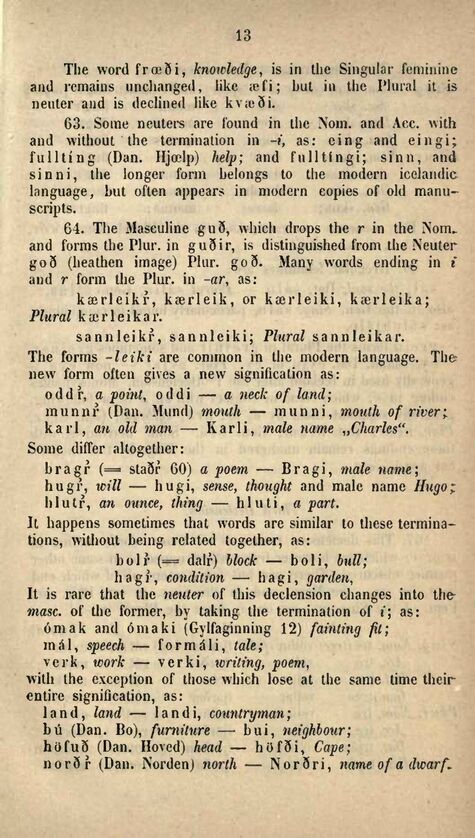
Full resolution (JPEG) - On this page / på denna sida - Part I - Inflection of Words - I. The Noun - IInd. Declension

<< prev. page << föreg. sida << >> nästa sida >> next page >>
Below is the raw OCR text
from the above scanned image.
Do you see an error? Proofread the page now!
Här nedan syns maskintolkade texten från faksimilbilden ovan.
Ser du något fel? Korrekturläs sidan nu!
This page has been proofread at least once.
(diff)
(history)
Denna sida har korrekturlästs minst en gång.
(skillnad)
(historik)
The word frœði, knowledge, is in the Singular feminine
and remains unchanged, like æfi; but in the Plural it is
neuter and is declined like kvæði.
63. Some neuters are found in the Nom. and Acc. with
and without the termination in -i, as: eing and eingi;
fullting (Dan. Hjœlp) help; and fulltingi; sinn, and
sinni, the longer form belongs to the modern icelandic
language, but often appears in modern copies of old
manuscripts.
64. The Masculine guð, which drops the r in the Nom.
and forms the Plur. in guðir, is distinguished from the Neuter
goð (heathen image) Plur. goð. Many words ending in i
and r form the Plur. in -ar, as:
kærleikr̓, kærleik, or kærleiki, kærleika;
Plural kærleikar.
sannleikr̓, sannleiki; Plural sannleikar.
The forms -leiki are common in the modern language. The
new form often gives a new signification as:
oddr̓, a point, oddi — a neck of land;
munnr̓ (Dan. Mund) mouth — munni, mouth of river;
karl, an old man — Karli, male name „Charles“.
Some differ altogether:
bragr̓ (= staðr̓ 60) a poem — Bragi, male name;
hugr̓, will — hugi, sense, thought and male name Hugo;
hlutr̓, an ounce, thing — hluti, a part.
It happens sometimes that words are similar to these
terminations, without being related together, as:
bolr̓ (= dalr̓) block — boli, bull;
hagr̓, condition — hagi, garden,
It is rare that the neuter of this declension changes into the
masc. of the former, by taking the termination of i; as:
ómak and ómaki (Gylfaginning 12) fainting fit;
mál, speech — formáli, tale;
verk, work — verki, writing, poem,
with the exception of those which lose at the same time their
entire signification, as:
land, land — landi, countryman;
bú (Dan. Bo), furniture — bui, neighbour;
höfuð (Dan. Hoved) head — höfði, Cape;
norðr̓ (Dan. Norden) north — Norðri, name of a dwarf.
<< prev. page << föreg. sida << >> nästa sida >> next page >>